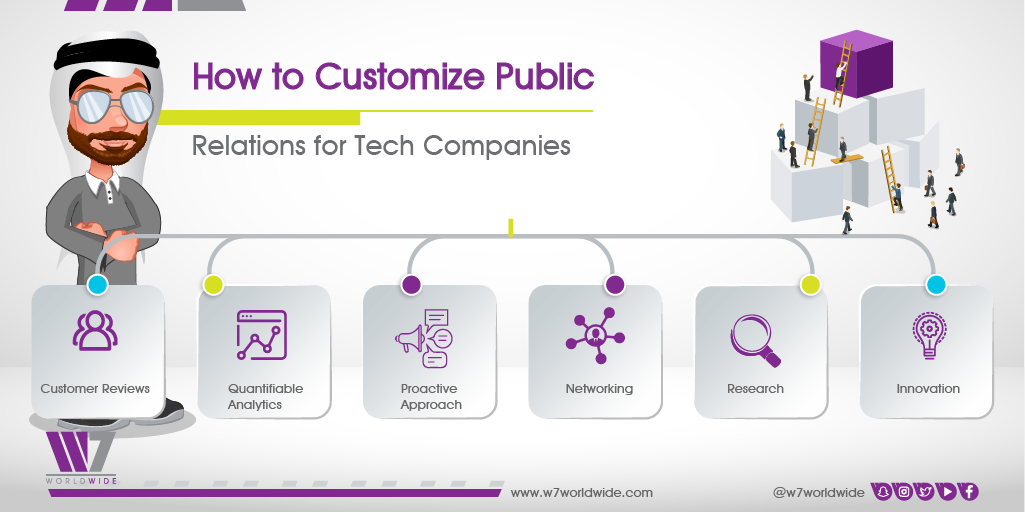Of its most important uses, public relations can help brands build reputation and increase sales. This is also true for tech companies, such as, e-commerce websites, digital solutions firms or up-and-coming startups. No matter what the size of the company or the kind of product it offers, tech companies can leverage PR to grow their business as well as boost corporate visibility. Additionally, PR can also support their fundraising efforts and help in attracting the best talent.
However, like any good marketing or advertising campaign, PR too needs to be customized according to the needs and goals of the company and the sector in which it operates. The following are some points to keep in mind for tech firms who wish to use PR to their advantage:
1. Innovation
The very heart of tech companies is its emphasis on innovation and essentially, being ahead of the rest. Your PR campaign should match those features. It should be able to forecast future problems and changes, while offering disruptive solutions. Moreover, the very essence of technology is its evolving nature, which should be reflected in the campaign as well i.e. your PR efforts should keep up with market trends and update accordingly on a regular basis. No one likes to see a six-month old campaign still doing the rounds for a company that claims to be at the forefront of digital innovation or a pioneer of technology!
2. Research
Tech companies mostly target a very specialized audience with distinctive interests. So if the PR team handling their campaign lacks the required background of the company’s product or technology, or is unable to quickly pick up any understanding of it, then the campaign is bound to be a failure. Such campaigns need to be researched thoroughly and require more than just a basic understanding of digital concepts, underlining the need for specialized tech PR experts with a grasp of the subject, a knowledge of the technical jargon as well as a unique insight into how to sell and market in this particular sector.
3. Networking
Your PR team should have excellent contacts in tech publications and other channels so that they are able to get you noticeable space in the form of guest articles, columns, expert advice, panelists, speaking opportunities etc. in magazines, newsletters, online portals, TV shows, events and conferences. These are the kind of publications and channels that target and serve your intended audience and carry a certain weight among them. Any direct or indirect nod of approval via these mediums for your company or product can go a long way in winning the trust of your potential customers. Tech events and forums also provide a networking platform for you to connect with the relevant people in the industry.
4. Proactive Approach
You need to start building relations with journalists, influencers, bloggers and other opinion leaders from Day 1. The goal here should not be to immediately start capitalizing on your contacts in the media, but to let them capitalize on your expertise and what you have to offer. You could provide an expert comment for a tech story they are working on, or invite them to networking events. This way they will warm up to you and support you when you execute your PR plan.
5. Quantifiable Analytics
PR for tech companies should focus on the achievement of measurable business objectives so as to help determine how effective the particular PR approach is. Indeed, PR can play an important role in quantifiable analytics such as SEO (Search Engine Optimization), which is the practice of increasing the quantity and quality of traffic to your website through organic search engine results. A perfect harmony between a company’s PR strategy and its SEO strategy can get you links on some of the most popular and influential websites. These links determine your brand’s ranking on Google and other search engines. Getting your brand name mentioned on numerous sites, magazines and portals can help build trust and eventually achieve a better ranking on Google, which is known for favoring bigger brands.
6. Customer Reviews
Positive customer reviews work better than any promotional material. Before making a purchase, most customers browse the internet to find out what others are saying about a particular product or a brand. A traditional approach here includes offering the product or service for free to journalists, bloggers, influencers and other media persons, in return for a review. More often than not, freebies such as free press trips, hotel stays, goodie bags, etc., yield glowing reviews. Even if the review is negative, the key is to be able to handle it well – by being nice to people in your response, showing that you care and are proactive in offering a solution. This goes a long way in managing your online reputation.


